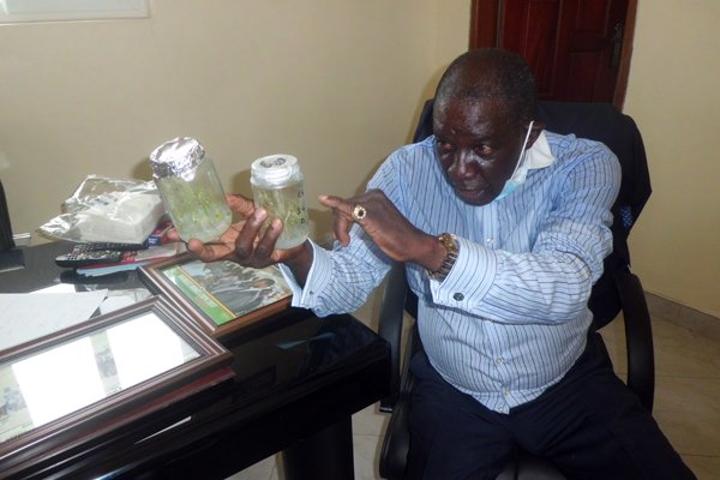Africa-Press – Uganda. Agricultural scientists engaged in Irish potato breeding in Uganda have in the past years developed rapid multiplication technology using tissue culture in potato seed tuber production.This is in a bid to provide large quantities of plantlets, micro tubers and mini tubers of high quality to farmers.
Micro tuber plantlets
and mini tubers are high quality starting materials that can be produced year round in In Vitro (in glass) conditions for the case of micro tuber plantlets or ex vivo (outside an organism) conditions for mini tubers.
One such initiative is by Agro Genetic Technologies Ltd (AGT) laboratories which is a subsidiary of AGT group of companies with Dr Erostus Nsubuga as the proprietor.While explaining the importance of breeding various propagated crops using tissue culture during the launch of his facility located in Namawojolo, Mukono District Dr Nsubuga noted that tissue culture plantlets are quality and clean seedlings free from pests and diseases.Farmers are at an advantage in using these seedlings because they will get good yields to improve their income and livelihoods.
Background
Dr Nsubuga, a tissue culture multiplier, started his own laboratory which he later named Agro-Genetic Technologies [AGT]. The technology which started in a kitchen at his Muyenga-based home has since metamorphosed into a full-blown banana and now Irish potato farming.
He began with banana plantlets which has since expanded at the Buloba-based AGT laboratory. However, three years ago he expanded his laboratory in Namawojolo mainly for breeding tissue culture Irish potatoes.Today, AGT laboratories have the capacity of producing up to 10 million tissue culture plants per annum depending on the type of crop which includes all varieties of the East African highland bananas (matooke), Irish potato, cassava and pineapple, among others.
What is tissue culture?
Plant tissue culture is a collection of techniques used to maintain or grow plant cells, tissues or organs under sterile conditions on a nutrient culture medium of known composition. Plant tissue culture is widely used in Asian countries and Europe to produce clones of a plant in a method known as micro propagation.
How tissue culture is done
During this procedure, plant cells can be removed from various parts of a plant and placed on media in petri plates. The media does not contain the growth hormones normally present in a plant that tells the cells which tissue to develop into. As a result, the cells do not differentiate and instead form a mass of cells called a callus that are not differentiated into at the tissue level.
The technique allows scientists and entrepreneurs to multiply millions of the same variety of a crop and provide seedlings to farmers who desire a specific variety, especially for crops propagated through cross Irish potato seed which are high on demand in the country.
The facilities at AGT have potential to conduct any modern biotechnology applications, including genetic engineering, to address any challenge farmers may face.Nsubuga has equipped his facilities with PCR machines for diagnostics and molecular biology applications, Lamina flow areas for aseptic tissue culture and microbiology work, screen houses for weaning and temporary storage of seed, media preparation areas for plant and microbiology work among others.
Breeding
Nsubuga derives the seedlings using In Vitro breeding technology. This is where they either pick tiny leaves or tissue of the plant which is placed in a media to get mini tubers.Mini-tubers develop green hard skins when kept in light for three weeks and should be stored in dark room at 4°C up to six months. Later, the scientists take it for trial in small mini-tubers of 5–10 mm diameter to produce more but smaller tubers than mini-tubers to grow between 15–20 mm diameters.
According to Nsubuga, from mini tuber in a tube, 30 mini seedlings of Victoria, Stargata and Arizona varieties are multiplied twice.It is the third generation which is given to seed multipliers who can go ahead to multiply in hundreds depending on the land capacity. Each kilogramme of multiplied seedlings is sold at Shs50,000.






